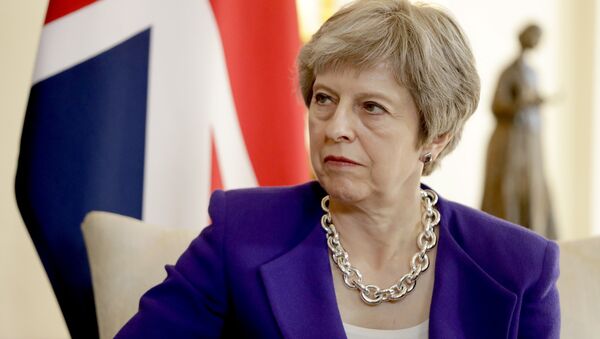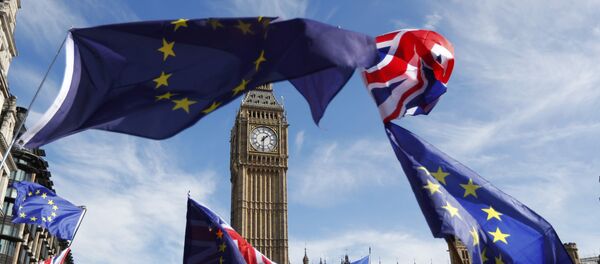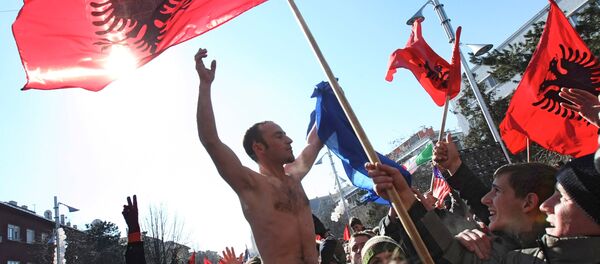Anti-Russia Sanctions
According to the media outlet, Theresa May will address European leaders at the summit in Brussels in an effort to push for the extension of anti-Russian sanctions. The prime minister will also reportedly highlight the importance of taking further action, including tackling alleged Russian propaganda and disinformation.
"Russia and other actors seem to be trying to sow disunity, destabilize our democracies and test our resolve. We must adapt our current defenses to the new normal and take responsibility for protecting international norms and institutions,” May will reportedly say.
Earlier in June, May warned that she would put enhanced sanctions against Moscow high on the agenda at the EU summit following the alleged poisoning attack on former Russian intelligence agent Sergei Skripal and his daughter Yulia in Salisbury in March.
READ MORE: EU Extends Sanctions Against Crimea Another 12 Months
In light of the purported incident, relations between Moscow and London have drastically deteriorated, with Theresa May immediately accusing Russia of being behind the alleged attack without providing any evidence to substantiate the claims.
The 28-member bloc's sanctions policy on Russia includes three dimensions: visa restrictions against Russian citizens, economic sanctions against a range of Russian state-owned oil, defense and financial companies, as well as restrictive measures against Crimea.
Brexit Talks
The prime minister is set to brief her European counterparts on the progress of Brexit negotiations after the EU Withdrawal Bill, also known as the Brexit Bill, had earlier received the Royal Assent, giving it the status of law. The EU leaders, in turn, are expected to exert more pressure on May and warn her about the mounting risk of a no deal Brexit to make a clear choice about the future of UK-EU ties.
READ MORE: Brexit Bill Becomes Law, Allowing UK to Leave the EU
May travels to Brussels following a week of cabinet splits over the UK’s divorce from the EU: on the one hand, there are pro-EU MPs and concerned businesses willing to preserve close economic ties with the bloc. On the other hand, there are hardline Brexiteers within her own party, who continue to call for the UK’s clean break from the union’s single market and customs union, and have called on the PM not to “betray Brexit.”
READ MORE: No Deal Brexit 'Devastating' for UK, May 'More Hostage Than Leader' – Tony Blair
According to a top government insider, cited by a number of British media, May will seek to reaffirm the UK's commitment to its EU partners even after Brexit occurs.
“The PM will re-emphasize the UK’s commitment to working with the EU to address the common challenge posed by illegal migration now and after the UK leaves the EU,” the source said.
The summit comes shortly after a number of European businesses, including the German-based carmaker, BMW, and the French aviation giant, Airbus, warned they would start preparing “contingency plans” and reconsider their position in the UK if they weren’t provided with details of Britain’s post-Brexit trade arrangements with the EU.
The UK's divorce from the European Union is scheduled for March 29, 2019. A transition period, which will see the UK maintain its presence in the single market and customs union, is set to last until the end of 2020.
Migration
Discussion of Brexit is expected to be overshadowed by the migration issue across the Mediterranean. According to a UK government source, the prime minister will insist on taking an “effective long-term approach,” which should be “comprehensive” and “tackle the problem at its root.”
"We have a long-term commitment to dealing with the migration problems that are facing Europe. We have provided resources for a number of years and continue to do so because it's in all our interests to deal with this problem at source,” the insider said.
This follows the UK government's announcement earlier this week that an extra British Border Force cutter vessel was being deployed to the Mediterranean to provide assistance with search and rescue operations.
Mediterranean nations, including Italy, have been calling to renegotiate the refugee quotas and revising the so-called Dublin Rule, which requires that would-be refugees file for asylum in the first EU member-state they arrive in.





